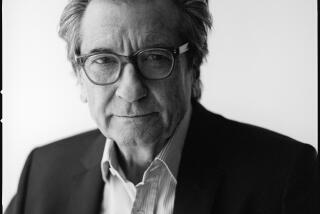From groupthink to group hug
- Share via
I’ve never met Joanna Smith Rakoff, but I would like to. Reading her debut novel, “A Fortunate Age,” I became convinced she must be funny, compassionate and observant. I think we would be friends.
The quality of a novel doesn’t depend on the personality of its author. Some of my favorite books were written by people I suspect were louts. And so it should not much matter that Rakoff’s writing makes her seem like a good person -- and it wouldn’t, were “A Fortunate Age” not a rewriting of Mary McCarthy’s “The Group,” the iconic tale of eight Vassar grads who move to New York in the 1930s.
There’s no way to read “The Group” -- whether you love it or hate it -- without recoiling a little at the author’s rapacious contempt for her characters. McCarthy’s was a vicious intelligence. This is the first thing that strikes a reader about Rakoff’s updating: People are kinder now.
It’s not necessary to have read “The Group” to appreciate “A Fortunate Age.” But because it follows the plotting of McCarthy’s novel with such impressive, even obsessive, fidelity from the opening wedding to the closing funeral (there are even patches of dialogue lifted almost wholesale), part of the fun is focusing on the changes Rakoff has made.
McCarthy’s eight Vassar graduates have turned into six Oberlin twentysomethings (two of them men); WASPS are now Jews; psychoanalysis becomes Alcoholics Anonymous. Some of these updates improve the original: The caddish Will Chase is a more interesting figure than cruel, boring Dick Brown.
Other changes seem forced. The number of anarchists running around Rakoff’s New York is particularly absurd; anarchy is not nearly the dynamite lodged in the contemporary imagination that Communism was in the 1930s. But these superficial changes only call more attention to the many superficial similarities between the books. The real differences lie deeper.
As “A Fortunate Age” begins, the group -- Sadie, Lil , Beth, Emily, Dave and Tal -- has gathered for Lil’s wedding to Tuck, an erstwhile graduate student now working at a startup tech magazine called “Boom Time.” It’s the late 1990s -- a fortunate age indeed, at least for those who want to make money doing something that seems just disreputable enough to worry their parents.
In college, they were stellar scholars and vegans and activists; Emily, the actress, once baked a coffin out of bread and ate her way out. Their collegiate prejudices against the professional classes have carried over into their career choices. The group looks with scorn upon its high school peers who are finishing medical school or hoping to make partner at a law firm. “Interesting people of her own age were writing novels or making films or acting,” thinks Beth, a graduate student, “or perhaps organizing Wal-Mart workers into unions.”
Unfortunately, being “interesting” doesn’t pay the bills, and, after four years of living in dilapidated apartments in the hinterlands, these Oberlin grads are remembering the station wagons of their childhoods with secret longing. And that, essentially, is the challenge that each one faces: how to remain true to their youthful ideals without sacrificing the upper-middle-class comforts of home. Here we have the tantalizing -- and ultimately false -- promise of the late 1990s: that maybe you didn’t have to compromise, maybe there was a way to have it all.
Weaving together a variety of disparate perspectives, “A Fortunate Age” is more a group portrait than a coherent narrative. This can be frustrating. Untied plot lines dangle like threads on the back of a tapestry, and it’s sometimes hard to keep the various affairs and betrayals straight. Still, the story is almost compulsively readable, and it is pleasant to spend time with Rakoff’s characters. All are flawed and occasionally foolish, but they have good intentions, and Rakoff endows each with a generous intelligence.
This is what makes her book different from McCarthy’s, which exposed how hypocritical those Vassar girls were. Rakoff is as caring of her characters as they are of one another, and when her characters fail, as they are bound to do, they are genuinely sorry.
The assumption in updating any novel is that not only the underlying themes but also the very contours of experience can track those of another era. It’s startling to realize how fresh some of the issues raised in “The Group” still seem: Is marriage a trap? Is work liberating? Breast or bottle? How does a person choose? And what happens when there’s no choice?
But if the questions are McCarthy’s, Rakoff’s answers tend toward Jane Austen, and not just because all plots move toward marriage. As satire, the book largely fails: The mirror it holds up to this era of egocentricity is far too flattering. But as an account of how young people are forced to reevaluate their assumptions, it’s more successful. The telling details, the meat of satire -- the books, movies, music, food, furniture and real estate -- here feel more like bric-a-brac cluttering the real story.
Rakoff might make fun of certain downtown bars and Brooklyn restaurants, but her heart isn’t in it. No doubt she’s had some nice times in those very spots. In the acknowledgments, she calls her book an hommage to “The Group.” But really, it feels like an hommage to her friends.
More to Read
Sign up for our Book Club newsletter
Get the latest news, events and more from the Los Angeles Times Book Club, and help us get L.A. reading and talking.
You may occasionally receive promotional content from the Los Angeles Times.









